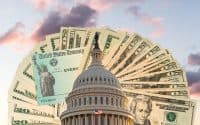Genworth Financial Inc. (NYSE: GNW) is still up significantly from its post-crash lows. Unfortunately, that is where the good news stops. Last week, we identified life insurance companies who were lining up to get TARP funds and other bailout program funds from Uncle Sam. Genworth was supposed to be one of those companies, or at least that was the reason for the huge gap-up on Wednesday. It turns out that the company does not qualify. The Treasury is not extending its deadline for Genworth’s application to become a savings & loan holding company.
It would be great to be able to dissect the balance sheet of these companies. But there is a belief because of toxic assets and losses these have taken in the equity markets has rendered balance sheet analysis virtually impossible. If the companies themselves cannot agree on the real value of what is in their investment portfolios, then how can independent analysis be carried out when you can’t see exactly what the assets are? What is real on the books of insurers is the liabilities for life insurance and other insurance policies which will ultimately come due?
Genworth said over the long holiday weekend that it “was informed by the U.S. Department of the Treasury that the deadline it set for approval by the Office of Thrift Supervision of Genworth’s application to become a savings and loan holding company passed before OTS completed its review of Genworth’s application and Treasury will not extend the deadline. Genworth will therefore not complete its intended acquisition of InterBank, FSB of Maple Grove, Minnesota, nor will it be eligible to participate in Treasury’s Capital Purchase Program established for companies that own a thrift.”
Again, we want to know why on earth these insurance companies would want to get in line to take Uncle Sam’s money after everything we have seen in the banking and brokerage sector. The obvious reason these companies are willing to take the government on as a partner is that they probably need the money sooner rather than later. But this puts all of the companies who hold their hands out in the line of fire in Washington D.C. politicians who can now attack compensation and every form of business practice. A problem at many insurers is that they, just like Wall Street, have a bonus culture as the means to pay their rain-makers. The notion that these bonuses are not really bonuses won’t matter. Politicians and reporters covering this issue generally do not get that. Even if they do understand this notion, shining a light on lavish offices and high compensation is a lay-up for getting air time and attention.
The real notion is that many of these life insurers may be in much worse shape on their investments than the market was considering just a week ago. Taking TARP money or other government bailout money is a very unattractive business strategy right now. But it may also represent the only go-to source to raise the sort of funding that comes with the “three-comma” size of the billions of dollars needed.
Things have become so hard at Genworth now that the market cap is not even $1 billion. Shares are down over 90% from last year and are down even worse from 2007 levels. Its most recent balance sheet (2008-end) lists over $98.4 billion in total liabilities. Counting its $107+ billion in total assets probably has more guess work and faith-based accounting for asset values than we’d care to think about.
The notion that Genworth and peers all need cash highlights the risks that are still out there. Another 35% rally in stocks and a recovery probably saves even most of the troubled firms. But there are still many hurdles out there that may act against these companies. Based on these and other notions, you could use the same formulas with different “values” to generate almost whatever you want. Maybe Genworth is worth $1.00. Maybe it is worth $10.00.
Most financial stocks have recovered handily today. Genworth is down 18% at $2.24. It had been down as much as 30% after the open. Determining Genworth’s real ‘worth’ is not an easy notion today.
JON C. OGG
Is Your Money Earning the Best Possible Rate? (Sponsor)
Let’s face it: If your money is just sitting in a checking account, you’re losing value every single day. With most checking accounts offering little to no interest, the cash you worked so hard to save is gradually being eroded by inflation.
However, by moving that money into a high-yield savings account, you can put your cash to work, growing steadily with little to no effort on your part. In just a few clicks, you can set up a high-yield savings account and start earning interest immediately.
There are plenty of reputable banks and online platforms that offer competitive rates, and many of them come with zero fees and no minimum balance requirements. Click here to see if you’re earning the best possible rate on your money!
Thank you for reading! Have some feedback for us?
Contact the 24/7 Wall St. editorial team.

